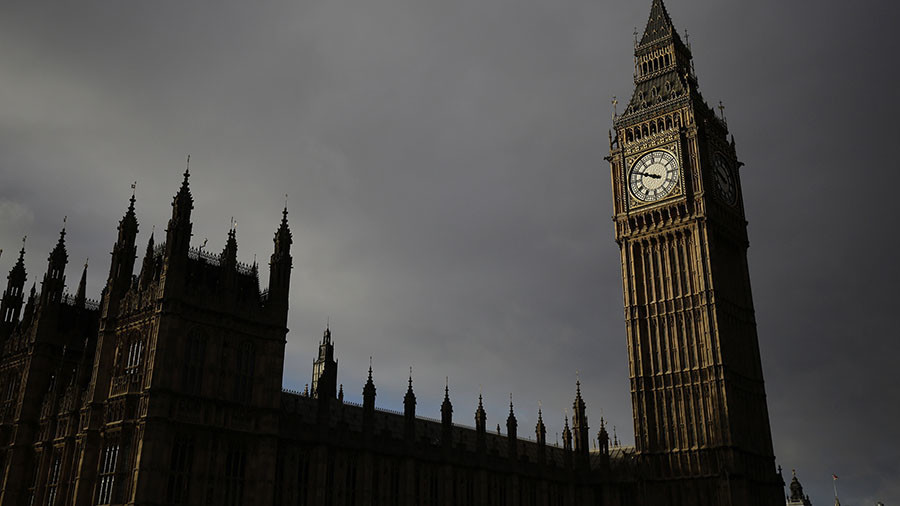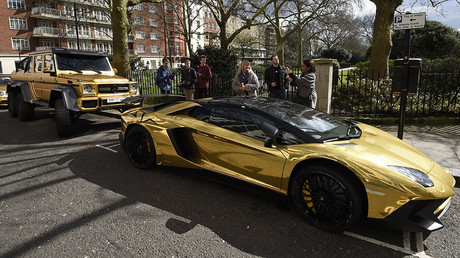Dirty money or dirty politics? UK hypocrisy over ‘Russian oligarchs’
Neil Clark is a journalist, writer, broadcaster and blogger. He has written for many newspapers and magazines in the UK and other countries including The Guardian, Morning Star, Daily and Sunday Express, Mail on Sunday, Daily Mail, Daily Telegraph, New Statesman, The Spectator, The Week, and The American Conservative. He is a regular pundit on RT and has also appeared on BBC TV and radio, Sky News, Press TV and the Voice of Russia. He is the co-founder of the Campaign For Public Ownership @PublicOwnership. His award winning blog can be found at www.neilclark66.blogspot.com. He tweets on politics and world affairs @NeilClark66

It was the financial heist of the century. The looting of Soviet Russia’s wealth by a group of well-connected oligarchs in the 1990s enriched a tiny few, but impoverished vast swathes of the country’s population. The foundations for this massive, reverse-Robin-Hood redistribution of wealth were laid with Gorbachev’s ‘restructuring’ economic reforms of the late 80s. However, the process reached its peak under Boris Yeltsin.
State assets were handed out like confetti to members of Yeltsin’s inner circle. By 1996 the Russian people, who had seen their living standards plummet following the end of communism, had had enough. Yeltsin’s popularity was down to single-figure ratings – with the Communists riding high in the polls. So the President’s oligarch friends – and their Western allies – worked together to make sure the election went the ‘right’ way.
The US got the IMF to give Russia a $10.2-billion loan so that state salaries, which had been unpaid for months, could finally be paid. With the media under government or oligarch control, a massive propaganda offensive was launched. When the vote came in the second round, Yeltsin was declared the winner with 54 percent of the vote. There were widespread accusations of election fraud, but the West didn’t care. “Yanks to the rescue; The Secret story of how US advisers helped Yeltsin win,” proclaimed Time magazine on its front cover. “Bill (Clinton) would pick up the hotline and talk to Yeltsin. He would tell him what commercials to run, where to campaign, what positions to take, he (the US president), basically became Yeltsin‘s political consultant,” admitted Dick Morris, a Clinton campaign manager.
The events of 1996 are well worth remembering when we hear unproven allegations about how Russia ‘fixed’ the 2016 US presidential election for Trump. With Yeltsin back in power, the oligarchs popped the champagne corks and prepared to make even more money on the backs of the Russian people.
"We hired First Deputy Chubais. We invested huge sums of money. We guaranteed Yeltsin's re-election. Now we have the right to occupy government posts and use the fruits of our victory," boasted Boris Berezovsky, the so-called ‘Godfather of the Kremlin’ to the Financial Times in 1997.
The 90s were a decade ordinary Russians would prefer to forget. Things only started to improve for them when the first moves were made to re-introduce some law and order into the system. The process started under Prime Minister Yevgeny Primakov, but accelerated under Vladimir Putin.
A seminal moment came with the arrest, in 2003, of Mikhail Khodorkovsky, who was believed to be the richest man in Russia. In fact, the current ‘Cold War 2.0’ against Russia, waged by Western neocons, can be traced back to this event. At the time of his arrest, Khodorkovsky had been holding talks with US oil companies over a merger with his conglomerate Yukos. The West, as I explained in the New Statesman, had seen the oligarchs as a way they could gain control over Russia. “Now with their man in Moscow behind bars, it is time for the neoconservative propaganda war against Putin to go into overdrive. Richard Perle was first out of the blocks, calling for Russia's expulsion from the G8 and its exclusion from any postwar Iraq oil contracts, and accusing it of collusion with Iran's nuclear-power program," I noted.
The Khodorkovsky case became a cause celebre, while Boris Berezovsky was also lionized by the sections of the establishment when he failed to return to Russia – where he was facing criminal charges – and was granted political asylum in Britain.
An Interpol Red Warrant for his arrest was ignored. The controversial oligarch, now rebranded as a ‘pro-democracy campaigner’ wined and dined UK media figures and was even invited on to the BBC television program Question Time to give his thoughts on ‘democracy.’
There was no, or little, concern about ‘dirty’ Russian money in London at this time. The more rich Russians who flocked to London, the better. But all that has hanged in recent months. The deliberate ramping up of Cold War 2.0 tensions, because of frustration with Russia’s role in thwarting ‘regime change’ plans for Syria, has meant that wealthy Russians living in Britain are now in the line of fire.
“Russians in Britain told to reveal their riches,” declared a headline of the neocon Times newspaper.
Security Minister Ben Wallace, as quoted by ITV, said that the "full force of government" would be brought to bear on foreign criminals and corrupt politicians who use Britain as a haven. His reference to the TV series McMafia – about Russian oligarchs – made it clear which ‘foreign criminals‘ he had in mind.
Unexplained Wealth Orders will be used to ask people with lots of money where they got their fortunes from. But only certain people.
Clearly, the system is open to abuse. Rich Russians who hate Putin and say the right things about the Russian government probably have no reason to be afraid. But those who aren’t personae non grata in Moscow will find things more difficult.
In January, the Daily Telegraph reported that Chelsea Football Club owner Roman Abramovich, who hasn’t fallen out with the Russian government, was for the first time included on “a list of officials and oligarchs” which could serve as “a basis for future Russian sanctions.”
Abramovich was also included in a Times ‘hit-list’ on March 18 on “Putin’s oligarch pals with billions in British assets,” when we were told that the UK government could draw on the list published by the US in January.
I think we can all see the way things are going. Wealthy Russians living in Britain will have to disassociate themselves from the Kremlin, if they’re to be left in peace. The key issue will not be ‘Where did you get your money?’ but ‘Who do you support?’
Some are already getting cold feet.
In March, in the aftermath of the Salisbury case, Sergei Kapchuk, a Russian businessman living in Britain, fled the country saying he was in fear of the British security services – having been pressurized to make an appeal to Putin by an ‘intelligence-officer-looking’ man before a television interview.
Some are already getting cold feet.
In March, in the aftermath of the Salisbury case, Sergei Kapchuk, a Russian businessman living in Britain, fled the country saying he was in fear of the British security services – having been pressurized to make an appeal to Putin by an ‘intelligence-officer-looking’ man before a television interview.
The anti-Russian witch-hunt has even led to the absurd spectacle of ‘rights activist’ Peter Tatchell calling for the children of Russian “regime officials and families” to be expelled from schools.
In The Independent last week, a Russian woman living in Britain wrote: “I quickly realized that acknowledging you’re a Russian in the UK is like admitting that you have a deadly disease and you only have a few weeks to live.”
The fact that she felt obliged to write the piece under the pseudonym “Valerie Stark” shows us how bad the situation has become.
The fact that she felt obliged to write the piece under the pseudonym “Valerie Stark” shows us how bad the situation has become.
It’s clear what’s underpinning the UK government’s so-called ‘fight’ against ‘dirty money‘ is not morality (how can it be, from a government that has imposed harsh austerity measures on the British public), but geopolitics. It has to be seen in its wider context as part of the warmongering elite’s Russophobic campaign. “They were not concerned before because they approved of the wholesale theft of Russia‘s wealth back then, and the Yeltsin regime which facilitated it,” George Galloway recently told RT.
READ MORE: UK crackdown on wealthy Russians ‘politically driven by Cold War mentality’ – George Galloway
Now though, with Russia getting in the way of neocon hegemonic aspirations in the Middle East, it’s a very different story.
Follow Neil Clark on Twitter @NeilClark66
Follow Neil Clark on Twitter @NeilClark66
Think your friends would be interested? Share this story!
The statements, views and opinions expressed in this column are solely those of the author and do not necessarily represent those of RT.


0 Comments:
Post a Comment
Subscribe to Post Comments [Atom]
<< Home